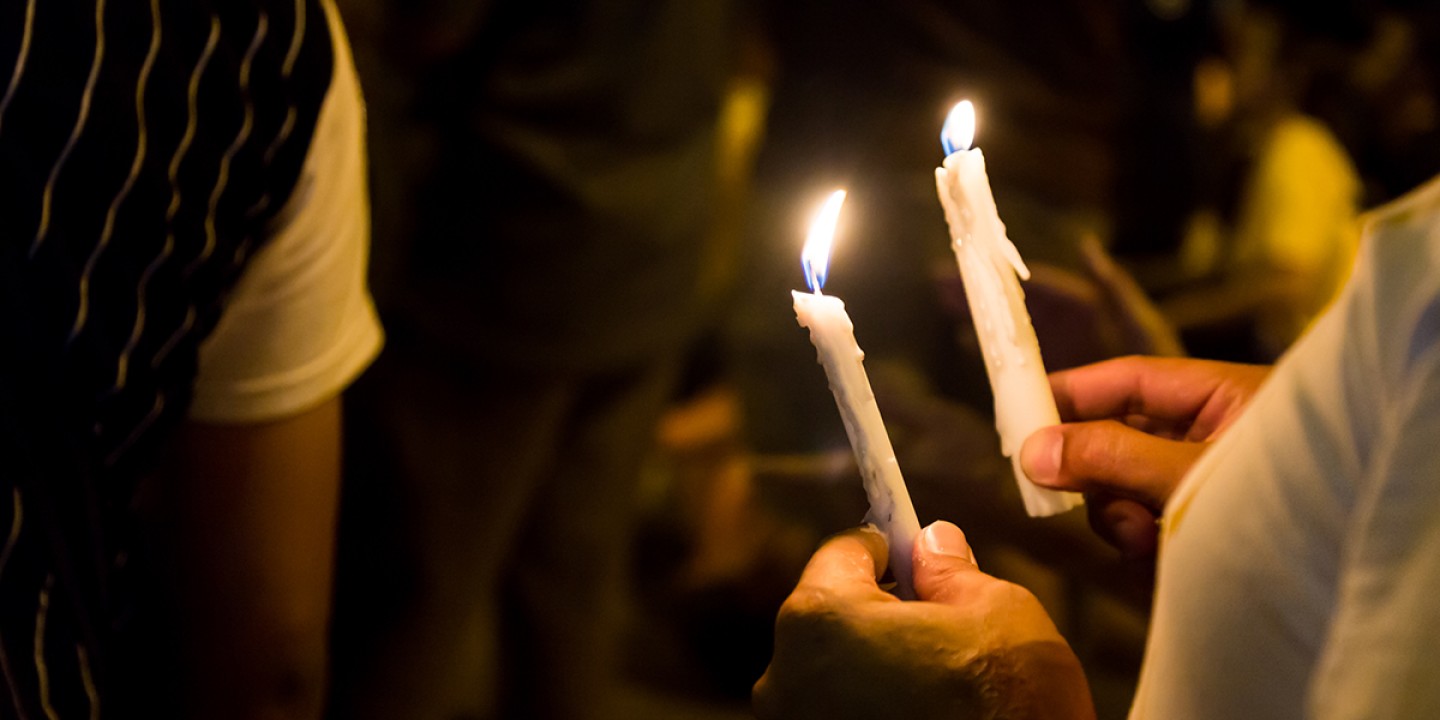Lamenting with my Jewish neighbors on Tisha B’Av
The Book of Lamentations resonates with the stories of oppressed immigrants and refugees.

During the evening of the ninth day of the Jewish month of Av, we gather in front of the courthouse downtown. All of us wear black. Many are fasting. Carolina Jews for Justice has organized a service of mourning for Tisha B’Av, a day set aside to remember the destruction of the temple in Jerusalem. This year Jews in our city lament the catastrophes of the past along with the terrors of the present, as the Trump administration’s anti-immigrant agents ravage our community—gestapo-like police who kidnap undocumented residents and transport them to detention centers.
We arrive in silence. “Our own history is filled with stories of displacement, of communities torn apart,” the rabbi calls out into the night. “We gather here to commemorate these historic tragedies and call for an end to the ongoing tragedy in this country, where families are torn apart and asylum seekers are denied refuge.” With these words she begins the service of prayer, centering us on passages from the scroll of Eicha, the book of Lamentations, with several verses read as a call and response:
My eyes are spent with tears, my heart is in tumult.
My being melts away over the ruin of my people.
Far from me is any comforter who might revive my spirit.
My children are forlorn, for the foe has prevailed.
The rabbi invites someone in the crowd to read an account from a Guatemalan woman, captured and now confined in Stewart Detention Center in Georgia. We respond with a verse from Lamentations 1: “Hear, all you peoples, and behold my agony: my girls and boys have gone into captivity.”
Ellen Davis classifies Lamentations as disaster poetry. “When a people has suffered the dehumanizing loss that war entails,” she writes, “when precious bodies are broken and discarded like clay pots, then the most rehumanizing thing a writer can do is express love and longing for what is lost.” On Tisha B’Av the Jewish community prays through Lamentations to mourn the long history of violence and persecution, deportation and exile. Their supplications are love poems for broken bodies and stolen lives, a service to remember the dead and long for restoration. “Return us to You, O God,” the poet of Eicha prays. “Renew our days like the dawn.”
As night falls, the rabbi passes around a box of taper candles. Each person lights a neighbor’s wick, and the one flame becomes many. “Blessed are You, Adonai, our God, Ruler of the universe, Creator of the fire’s light,” she prays over our candles, her face toward the dark sky. Soon we read out the names of the dead: people who have died in ICE’s detention centers, migrants killed by border patrol agents. The rabbi offers a prayer to mourn the loss of so many lives, kaddish for these dead and for the multitudes.
An organizer reads a prayer by Tamar Fox, written for this ritual of mourning and remembrance. “Avinu malkeinu, Our Parent, who shepherded us through the wilderness, sheltered us from evil,” she prays. “We cry out to you now for families in the wilderness, children plucked from the arms of parents, young people living behind bars.” By candlelight our group processes up the sidewalk as we recite kinot—dirges for the dead, elegies for the ruins. “Oy, meh haya lanu,” our anguished song echoes through the streets. Oh, what has befallen us.
To end the service we circle together. I glance at the people around me, each face aglow as our candles’ flames dance in the darkness. The last stanza from Havah Eshel’s poem “Tisha B’Av” flashes through my mind: “then circle circle / and circle again / till light meets light / in a new ceremony / of temple building love.” Here, on this night, the lamentations of the Jewish community reach out to all who suffer from the president’s immigration policies—a ceremony of spiritual embrace, the flickers of solidarity. Hope feels like the warmth of neighbors who cry out for tikkun olam, the repair of the world. This diasporic assembly includes in its prayers all the people whose lives have been crushed by the hands of ICE agents, border patrol officers, and detention center guards. Along with elegies for Jerusalem, this holy ritual remembers the thousands of children in cages across the country, the reports of sexual abuse in detention centers, and the asylum seekers sent back to die.
I ask CJJ’s Dove Kent why it’s important for her to remember the current administration’s oppression of our immigrant community during this service. “The stories that we pass down in Jewish tradition, of our persecution and expulsion, teach our hearts to remain open,” she tells me. “When we see immigrants hunted down and expelled from our country, they are not separate from us—because our stories belong to each other.”
These have been devastating years. There are ruins everywhere. Tomorrow morning, like this morning, like every morning since Trump’s election, as I awake from the fog, for a vanishing moment I’ll be convinced that all of this havoc has been a vicious dream—until I scroll through Twitter and the panic of our situation crashes into me.
“Even now our eyes pine away in vain for deliverance,” I pray words from Lamentations as I hold onto the memory of that Tisha B’Av service. “Still we wait for a nation that will not help.”
A version of this article appears in the print edition under the title “Lamentations past and present.”





